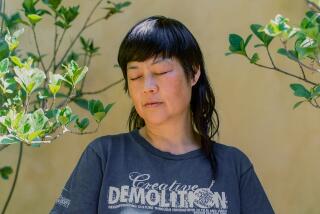Ping Lady
- Share via
SANTO DOMINGO, Dominican Republic — How good could she be?
I know that Gao Jun Chang has a distinctive place in Olympic lore, having competed for two countries in the Olympics. She won a silver medal for her native China in table tennis in the 1992 Games, then, having become a U.S. citizen, was the first American to advance beyond the first round in her sport in the 2000 Games.
But I also know I’ve played quite a bit.
Chang calls it table tennis, I call it ping pong.
Chang, 34, started playing when she was 5, I started at about the same age. Chang’s parents saw the sport as her ticket to a better life, my parents saw it as a way to get me out of their hair.
Chang played at a sports school, her province team and then her national team. I played in backyards, rec centers and at barbecues.
She has faced the top players in the world, but she has never faced me. So, having asked to interview Chang after her practice session at the table tennis facility before her first match in the XIV Pan Am Games, I also asked to play her.
I’m no George Plimpton, who went through training camp with the Detroit Lions and wrote a book called “Paper Lion,” then got into the ring with Archie Moore and wrote a book called “Shadow Box.”
But ping pong? Who hasn’t picked up a paddle and fantasized that they could do magical things with it. I certainly have.
Chang graciously agrees to play me -- or rather humor me -- and even gives me her paddle. We walk to a table in the center of the table tennis facility, one of several venues constructed for the Games in the East Park Pan Am complex.
Face to face with my fantasy match, or my worst nightmare, I examine my opponent. Probably tougher, I concede, than my last opponent, a middle-aged beer drinker I faced on a cruise-ship tournament. Chang stands 5-foot-7 with a small frame and a gracious manner. Surely she does not have the strength or temperament to slam the ball down my throat.
*
Chang was born in Baoding, China, where her father, Daan, worked in a film manufacturing plant. A recreational table tennis player himself, Daan introduced her to the game and felt that, even at 5, she had the required reflexes and feel for it.
Her parents immediately enrolled her in a sports school where she practiced two hours a day after attending elementary school.
At 12, Chang was elevated to a province team. Her parents decided to return to their roots in northern China with her 5-year-old sister, Gloria. But Chang had to stay behind with the province team. Table tennis was no longer a childhood game. Having shown a talent for the sport, she now had to devote her life to it.
“I have no choice to think in China,” she said. “The parents control everything. I will play table tennis and I don’t have to do anything else. Just focus, they tell me, and win and I can go to the national team and go on to be a world champion. That is all I know.”
*
As we warm up, I hit both corners with my shots. “Oh, you make me move,” she says as she glides over. “Most people don’t make me move.”
I am wise to her. She is trying to make me overconfident.
“Go ahead and serve,” I tell her, suddenly wishing I had a batting helmet.
No bullet serve comes my way. Instead, Chang throws the ball high in the ball, as if she were serving in a tennis match, watches it intently as it comes down softly on the table and then, after it bounces only a couple of inches back up, she smoothly caresses the ball with her paddle, causing it to cross the net and bounce directly in front of me.
A seemingly easy return with no discernible spin, I try to whack it back at her, but the ball inexplicably hooks badly, missing the table on her right side by five feet. I must have been holding the paddle wrong, I assure myself
She serves again, same tennis toss, and this time, I figure I’ll hit to her left side. I aim in that direction, but somehow, the ball winds up again sailing off to the right, five feet wide of the table.
This never happened at those barbecue matches.
*
When she was 17, Chang made the Chinese national team. The training got more rigorous, the rules stricter. Those caught talking instead of playing had to run laps. Chang ran her share.
“I never thought about boys until I was 20,” she said. “My parents would tell me, ‘If you become a world champion, you’ll be very rich and you’ll find somebody good. If you are no good in table tennis, you’ll just be like a normal person.’ ”
She was good enough to win Olympic silver in women’s doubles at the Barcelona Games in 1992.
Later that year, making her first trip to America to compete in a tournament in Las Vegas, she met Chinese-American Frank Chang, a computer engineer two years older than her. They married a year later and she moved to his home in Maryland, thus ending her amateur career in China.
“I’ve got to go with my husband,” she said. “I have no mind of my own. I am told to do this, I got to do this. I am told to do that, I got to do that. I never think for myself.”
Chinese sports officials didn’t object to her departure.
“At 24, I was getting too old for that team,” she said. “They didn’t care. There is always someone behind you to replace you. Especially if you lose.”
*
Now, it’s my turn to serve. No more Mr. Nice Guy. I whip my fastest serve at her and she flicks it back as if she were flicking a fly off her wrist. But I counter with a perfect shot to her backhand side and she nonchalantly lets it get past her.
I have a point.
Emboldened, I try it again when she returns my next serve, shooting for her backhand side, but, showing that her competitive juices flow even in a meaningless rally with a meaningless opponent, she reacts, reaching out seemingly effortlessly to backhand the ball past me as she says with a smile, “Not this time.”
*
Marriage proved less than idyllic for Chang. She began to miss table tennis.
“My husband and his family said I should not travel,” she said. “They told me, ‘You are a woman. You should stay home.’ I don’t agree. A woman can be a big success. We had lots of problems.”
They didn’t end when Frank got a job in Shanghai. Coming back to China further stoked Chang’s desire to pick up a paddle.
So she did, returning to international competition as an American (she had become a U.S. citizen upon her marriage).
Chang soon became a star for the U.S., winning gold medals in singles and doubles in the 1999 Pan Am Games. After her precedent-setting performance in the 2000 Olympics, Chang established another high-water mark for Americans in the sport three months ago when she reached the quarterfinals of the World Table Tennis Championships in Paris. And she has already qualified for next year’s Olympics in Athens.
Her marriage did not go as well. Unable to resolve her return to table tennis with her husband, she and Frank divorced last year.
Chang has remained in Shanghai, where she is attending Eastern China University, majoring in economic trade. She practices with the college players there, joining her U.S. teammates for only major international events.
“I think I’m a success,” she said. “My life is good. Playing for the U.S. is a lot freer. You still don’t want to lose. But when you play for China, you cannot lose.”
*
I am losing every point now. But finally, after an actual rally, I hit a ball up the air that comes down right on the back edge of the table, nicking it just enough to send the ball to the floor. Even Chang can’t get a paddle on it.
“Lucky,” she says.
Not the way I’ll tell it, over and over and over again, my fantasy fulfilled.
More to Read
Go beyond the scoreboard
Get the latest on L.A.'s teams in the daily Sports Report newsletter.
You may occasionally receive promotional content from the Los Angeles Times.






